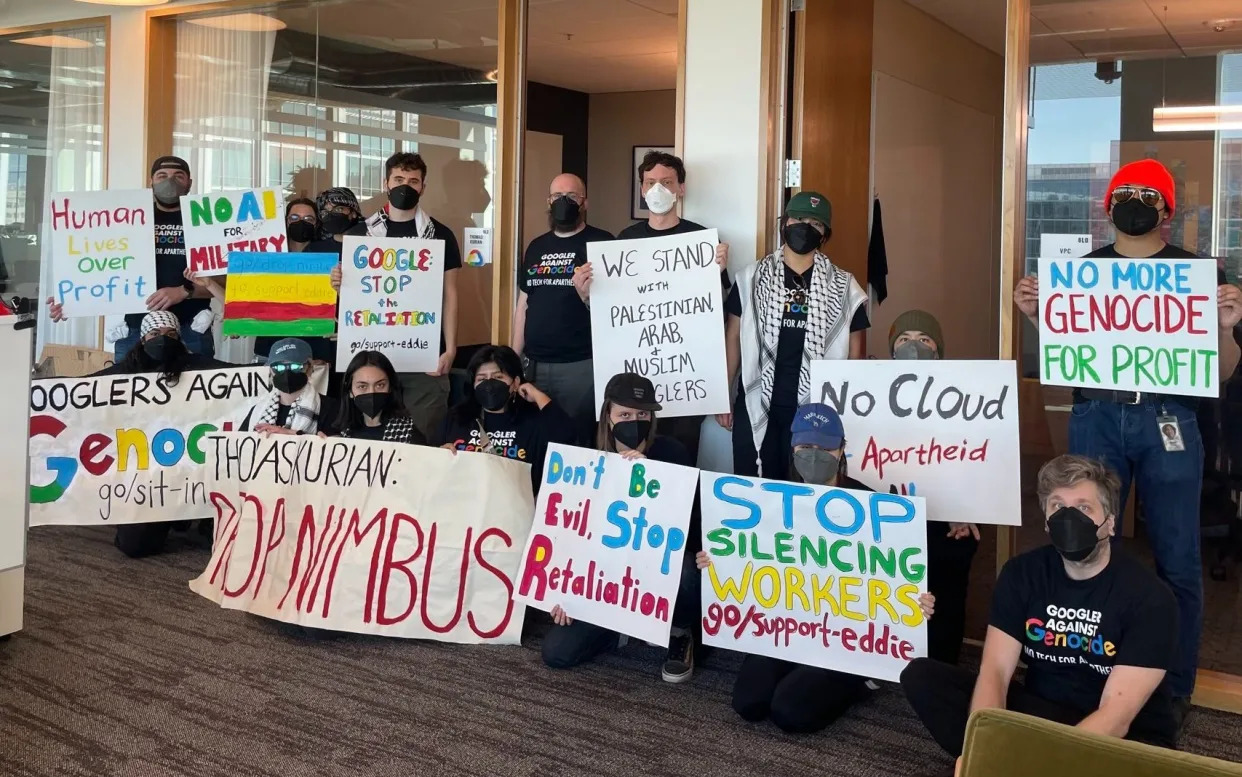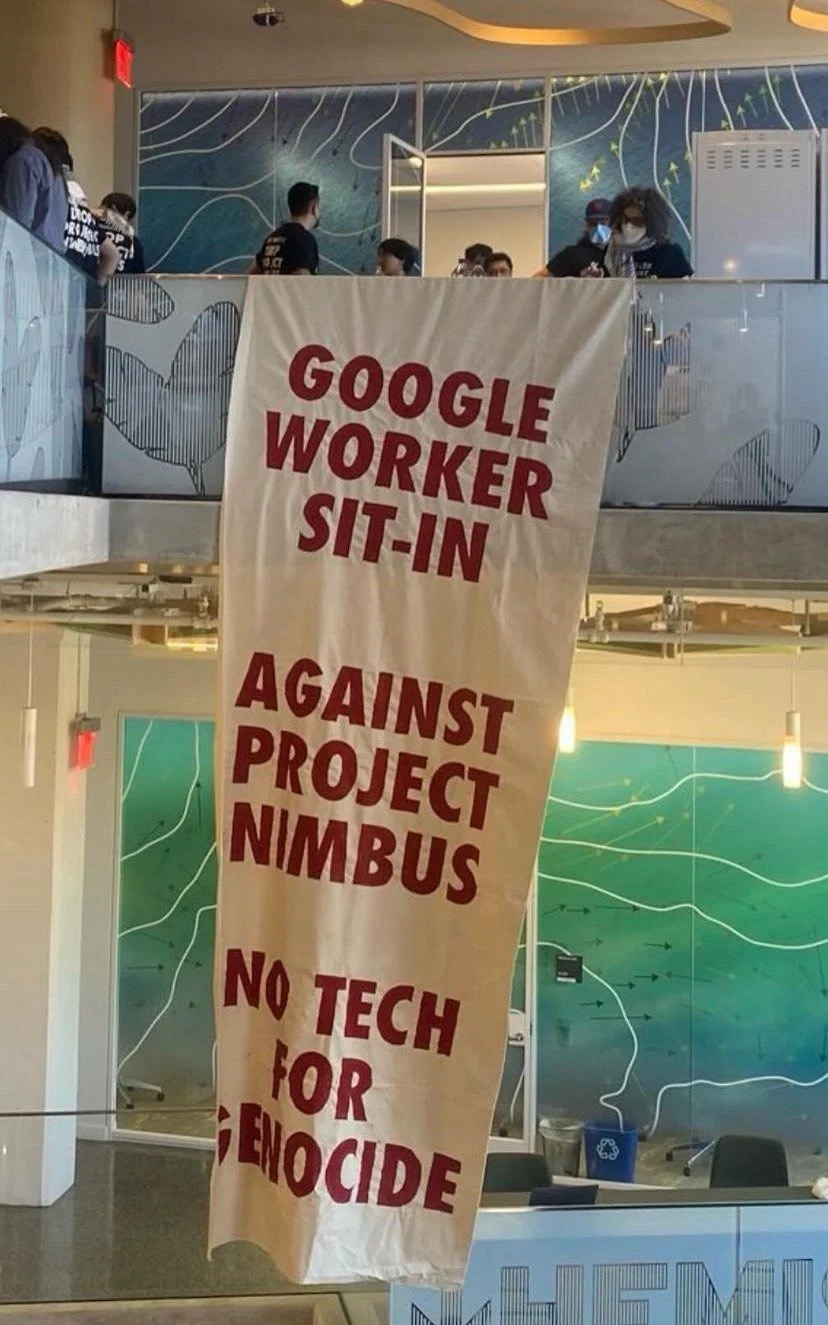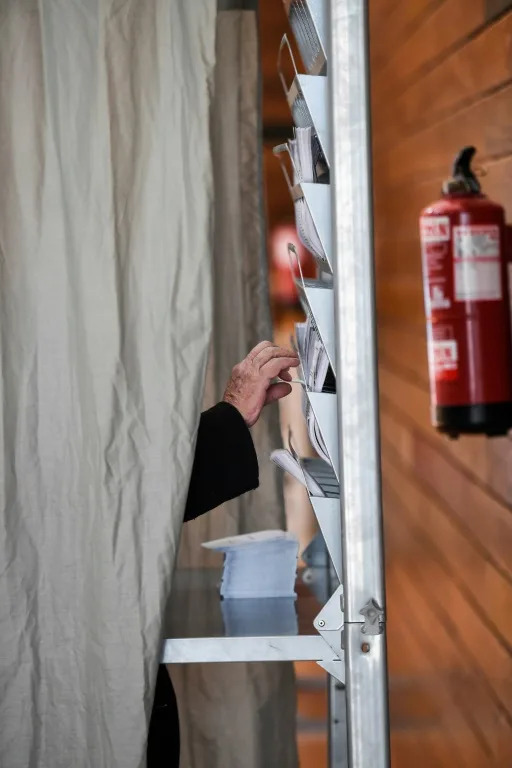"THE MOST MORAL ARMY IN THE WORLD"
US set to sanction an entire IDF battalion with a history of alleged human rights abuses on the West Bank, report says
Rebecca Rommen
Sun, April 21, 2024
The US is set to sanction an IDF unit following reported human rights abuses, Axios reports.
The Netzah Yehuda battalion was implicated in the death of an 80-year-old US citizen in 2022.
Israel's Prime Minister Benjamin Netanyahu decried the US decision, calling it "a moral low."
The US is poised to sanction a controversial battalion in the Israel Defense Forces (IDF) for reported human rights abuses, Axios reported.
Secretary of State Antony Blinken is expected to announce sanctions against the Netzah Yehuda battalion for alleged human rights violations in the occupied West Bank.
It would be the first time the US has imposed sanctions on an Israeli military unit. The battalion is composed of over 900 soldiers.
The news of the possible sanctioning of the IDF unit came as the House of Representatives on Saturday passed a bill that includes more than $14 billion in military aid to Israel as well as $9 billion in humanitarian assistance, much of which will go to Gaza.
The unprecedented sanctions will prohibit the battalion and its members from receiving US military assistance or training.
The imposed measures are in accordance with the 1997 Leahy vetting policy, which forbids US foreign aid and Defense Department training programs from going to foreign security, military, and police units credibly alleged to have committed human rights violations.
In 2022, the State Department requested the US embassy interview Israelis and Palestinians about the battalion's conduct in the West Bank following reports of abuse of Palestinians, the Israeli outlet Haaretz, reported.
Last month, a State Department panel recommended that Blinken disqualify multiple Israeli military and police units operating in the West Bank from receiving US aid, ProPublica reported.
Blinken confirmed on Friday that he had made determinations based on this investigation and stated, "You can expect to see them in the days ahead" regarding the sanctions, per Axios.
Senior members of the Israeli government pushed back at the potential sanctions move against the Netzah Yehuda battalion.
"Sanctions must not be imposed on the Israel Defense Forces," Israeli Prime Minister Benjamin Netanyahu wrote on X.
"At a time when our soldiers are fighting the monsters of terror, the intention to impose a sanction on a unit in the IDF is the height of absurdity and a moral low," he wrote.
Minister of Defense Benny Gantz wrote on X that the Netzah Yehuda battalion was "an inseperable part of the Israel Defence Forces."
Radical settlers

Israeli settlers hold a protest march from Tapuach Junction in the Israeli-occupied West Bank, April 10, 2023.REUTERS/Nir Elias
The Netzah Yehuda unit, part of the Kfir brigade, was originally set up in 1999 to accommodate the religious beliefs of recruits from ultra-Orthodox and national religious communities, including those from extremist settlements.
All of its members are men. The unit has a reputation for recruiting some radical settlers who are not accepted by other IDF formations, said Axios.
Historically, the Netzah Yehuda battalion has been primarily deployed in the West Bank, gaining notoriety for its treatment of Palestinians.
Notably, soldiers from the unit were accused in the death of Omar Assad, an 80-year-old US citizen, who died of a heart attack in 2022 after being detained, bound, gagged, and abandoned by members of the battalion.
While Israel has deployed the Netzah Yehuda battalion out of the West Bank since the incident, the unit has continued to serve— primarily in the country's north and in the Gaza Strip during the ongoing conflict with Hamas.
Business Insider contacted the State Department for comment.
Washington gives $3.8 billion in annual military assistance to Israel and has remained a steadfast ally throughout Israel's military campaign against Gaza, which has killed over 30,000 Palestinians.
US expected to sanction IDF unit over alleged human rights abuses
John Bowden
Sun, April 21, 2024
A unit of the Israel Defense Forces (IDF) is expected to be sanctioned by the Biden administration this week after a ProPublica investigation claimed that the State Department sat for months on evidence of serious human rights abuses.
Reports of the expected move have enraged the Israeli government headed by Prime Minister Benjamin Netanyahu and comes as US-Israel relations continue to degrade under the stress of Israel’s military onslaught in the Gaza Strip.
The investigation published by the nonprofit investigative outlet ProPublica on Wednesday revealed that an internal State Department investigation had, months ago, identified several Israeli police and military units facing credible accusations of violating human rights — some even faced allegations of torture. It’s an investigation required by law, with the panel having been set up as part of the so-called “Leahy law”, which prohibits US funding from going to military or security units found to have committed atrocities.
According to ProPublica, the State Department board leading this investigation made recommendations to halt US assistance to these units months ago; Secretary of State Antony Blinken has not acted upon or published the findings, until now.
Now, Axios reports that the agency will take action this week and issue a ban on US military assistance to the Netzah Yehuda battalion, a controversial unit of the IDF which was set up to include ultra-Orthodox Israelis and is described by the Israeli newspaper Haaretz as a “West Bank militia” serving as part of the IDF. The unit draws recruits from the rightwing Israeli settler movement, which often is engaged in violent clashes with Palestinians. The settlement movement has also increasingly come under scrutiny by the Biden administration in recent weeks.
At a press conference on Friday, Mr Blinken was asked about the ProPublica investigation and told reporters that he would issue his response to the internal State Department probe “in the days ahead”.
Axios also reported on Saturday that the Netzah Yehuda battalion was not the only unit identified in the State investigation but others targeted in the probe had supposedly “remedied” their behaviour, evading sanctions.
The Independent has reached out to the State Department for comment.
Founded in 1999, the ultra-Orthodox Netzah Yehuda battalion was created to allow the service of Israel’s Haredi Jewish minority. The battalion’s existence is a point of conflict within that community, which largely opposes Israel’s mandatory military service requirements.
According to Axios, the battalion’s human rights record has been on the US government’s radar since at least 2022 after its members left an 80-year-old Palestinian-American man gagged and bound in the cold for hours, leading to his death.
Benjamin Netanyahu responded to news of the impending sanctions of the IDF Netzah Yehuda unit on Twitter, writing: “It is forbidden to impose sanctions on the Israel Defense Forces!”
“At a time when our soldiers are fighting the monsters of terror, the intention to impose a sanction on a unit in the IDF is the height of absurdity and a moral low,” said the prime minister. “The government headed by me will act by all means against these moves.”
Israeli PM Netanyahu says he will fight any sanctions on army battalions

Israeli Prime Minister Benjamin Netanyahu convenes the weekly cabinet meeting, in Tel Aviv
Updated Sun, April 21, 2024
By Maayan Lubell
JERUSALEM (Reuters) -Israeli Prime Minister Benjamin Netanyahu said on Sunday he would fight against sanctions being imposed on any Israeli military units for alleged rights violations, after media reports said Washington was planning such a step.
Axios news site on Saturday reported that Washington was planning to impose sanctions on Israel's Netzah Yehuda battalion, which has operated in the occupied West Bank, though the Israeli military said it was not aware of any such measures.
On Friday, the United States announced a new series of sanctions linked to Israeli settlers in the West Bank, in the latest sign of growing U.S. frustration with the policies of Netanyahu, whose coalition government relies on settler parties.
"If anyone thinks they can impose sanctions on a unit of the IDF (Israel Defence Forces) - I will fight it with all my strength," Netanyahu said in a statement.
The State Department declined comment beyond remarks made on Friday by U.S. Secretary of State Antony Blinken.
Blinken said he had made "determinations" regarding accusations that Israel violated a set of U.S. laws that prohibit providing military assistance to individuals or security force units that commit gross violations of human rights.
Earlier this week, the Pro Publica investigative news organization reported that a special State Department panel known as the Israel Leahy Vetting Forum had recommended months ago to Blinken that multiple Israeli military and police units be disqualified from receiving U.S. aid, after allegations of human rights violations.
ON THE RISE
The incidents that were the subject of allegations took place in the West Bank and mostly occurred before Israel's war with Hamas in Gaza began on Oct. 7, the outlet said.
Before the Gaza war, violence had already been on the rise in the West Bank, land that the Palestinians seek for a state, and it has risen since with frequent Israeli raids, Palestinian street attacks and settler rampages in Palestinian villages.
The Israeli military said the Netzah Yehuda battalion is an active combat unit that operates according to the principles of international law.
"Following publications about sanctions against the battalion, the IDF is not aware of the issue," the military said. "If a decision is made on the matter it will be reviewed. The IDF works and will continue to work to investigate any unusual event in a practical manner and according to law,"
In 2022, Netzah Yehuda's battalion commander was reprimanded and two officers were dismissed over the death of an elderly Palestinian-American whom the unit's soldiers had detained in the West Bank, an incident that stirred concern in Washington.
There have been several other incidents in recent years, some captured on video, in which Netzah Yehuda soldiers were accused of or charged with abusing Palestinian detainees.
(Reporting by Ari Rabinovitch and Maayan Lubell in Jerusalem and Humeyra Pamuk in Washington; Editing by Hugh Lawson and David Holmes)
Biden admin sanctions Israel national security minister ally, reportedly weighs expanding to IDF unit
Greg Wehner
FOX
Sat, April 20, 2024

The Biden administration could announce sanctions against an Israel Defense Forces (IDF) battalion for alleged human rights violations in the West Bank before the Oct. 7 attack on Israel by Hamas-led terrorists, according to reports.
Axios reported that U.S. Secretary of State Antony Blinken could announce the sanctions against IDF battalion "Netzah Yehuda" within days, marking the first time the U.S. will have placed sanctions on military units operated by Israel.
If sanctions are imposed, the battalion and its members would no longer receive any type of training or assistance from the U.S. military, sources reportedly told the publication.
The U.S. is prohibited under the Leahy Law, from providing any sort of foreign aid or defense department training to countries responsible for alleged human rights violations based on credible information.
Sat, April 20, 2024

The Biden administration could announce sanctions against an Israel Defense Forces (IDF) battalion for alleged human rights violations in the West Bank before the Oct. 7 attack on Israel by Hamas-led terrorists, according to reports.
Axios reported that U.S. Secretary of State Antony Blinken could announce the sanctions against IDF battalion "Netzah Yehuda" within days, marking the first time the U.S. will have placed sanctions on military units operated by Israel.
If sanctions are imposed, the battalion and its members would no longer receive any type of training or assistance from the U.S. military, sources reportedly told the publication.
The U.S. is prohibited under the Leahy Law, from providing any sort of foreign aid or defense department training to countries responsible for alleged human rights violations based on credible information.

Fox News Digital reached out to the U.S. State Department and White House but did not immediately hear back.
While speaking to reporters on Friday, Blinken was asked about Israel’s violations of human rights in the West Bank and recommendations made by his department to cut military aid to certain Israeli units.
Blinken started by saying the Leahy Law was important and applied across the board.
U.S. Secretary of State Antony Blinken (L) meets with Israeli Prime Minister Benjamin Netanyahu (R) in Tel Aviv, Israel on Nov. 3, 2023.
"When we’re doing these investigations, these inquiries, it’s something that takes time, that has to be done very carefully both in collecting the facts and analyzing them – and that’s exactly what we’ve done," he said. "And I think it’s fair to say that you’ll see results very soon. I’ve made determinations; you can expect to see them in the days ahead."
On Friday, the U.S. imposed sanctions on an ally of Israel’s national security minister and two entities that raised money for Israeli men who allegedly committed settler violence. The new sanctions came in addition to others placed on five settlers and two unauthorized outposts earlier this year. The increased sanctions also show growing frustration of Israeli Prime Minister Benjamin Netanyahu by the U.S.
Friday’s sanctions will reportedly freeze U.S. assets held by those targeted while also barring Americans from dealing with them.

Israeli Prime Minister Benjamin Netanyahu convenes the weekly cabinet meeting at the Defence Ministry in Tel Aviv, Israel, January 7, 2024.
Right-wing members of Netanyahu’s governing coalition that is pushing to expand Jewish settlements along with the annexation of the West Bank are reportedly upset with the Biden administration for making moves against the Israeli settlers.
Also adding fuel to the fire is the tension between Israel and Washington caused by the latter urging Israel to restrain themselves from attacking Iran.
One of the individuals sanctioned by the U.S. was Ben-Zion Gopstein, the founder and leader of the right-wing group Lehava. The group does not support Jewish assimilation with non-Jews and has about 5,000 members.
"Under Gopstein’s leadership, Lehava and its members have been involved in acts or threats of violence against Palestinians, often targeting sensitive or volatile areas," State Department spokesperson Matthew Miller said in a statement obtained by Reuters.
Miller warned that additional steps would be taken if Israel does not act to prevent extremist attacks as violence continues to escalate in the West Bank.
The European Union also agreed to impose sanctions against Lehava and other groups.
But the U.S. is not just targeting Israel. In fact, last week, White House National Security Advisor Jake Sullivan announced sanctions would be placed against Iran after its regime attacked Israel last Saturday.
The sanctions were announced as Republicans criticized the Biden administration for not being tough enough on Iran, pointing to a waiver extended by the White House in November 2023 that released $10 billion of previously escrowed funds to Iran.
Sullivan said that the actions the U.S. is taking will "continue a steady drumbeat of pressure to contain and degrade Iran’s military capacity and effectiveness and confront the full range of its problematic behaviors."
"Over the last three years, in addition to missile and drone-related sanctions, the United States has sanctioned over 600 individuals and entities connected to terrorism, terrorist financing and other forms of illicit trade, horrific human rights abuses, and support for proxy terrorist groups, including Hamas, Hezbollah, the Houthis, and Kataib Hezbollah," the statement added.
"The pressure will continue. We will not hesitate to continue to take action, in coordination with allies and partners around the world, and with Congress, to hold the Iranian government accountable for its malicious and destabilizing actions."
Fox News Digital's Andrea Vacchiano and Reuters contributed to this report.
US set to sanction ultra-Orthodox IDF battalion
Melanie Swan
Sun, April 21, 2024

The Netzah Yehuda is an ultra-Orthodox battalion in the IDF
- MENAHEM KAHANA/AFP
The US is set to sanction an ultra-Orthodox unit of the Israel Defence Forces (IDF) in what would be an unprecedented move.
If confirmed, Joe Biden’s White House would ban the Netzah Yehuda battalion from receiving US military supplies or training. The unit, made up exclusively of ultra-Orthodox fighters, has been accused of human rights violations in the occupied West Bank.
Antony Blinken, the US Secretary of State, said on Friday that he will soon reveal the results of an investigation using the Leahy Law, which prohibits military assistance to foreign security forces that violate human rights.
Israeli prime minister Benjamin Netanyahu has criticised the decision, calling it “the height of absurdity and a moral low”.
He was joined by his defence minister, Benny Gantz, who said sanctioning an IDF unit and its soldiers “sets a dangerous precedent”.
“The Netzah Yehuda battalion is an inseparable part of the Israel Defense Forces. It is subject to military law and is responsible for operating in full compliance with international law,” he said.
“The State of Israel has a strong, independent judicial system that evaluates meticulously any claim of a violation or deviation from IDF orders and code of conduct, and will continue to do so.”
The US is set to sanction an ultra-Orthodox unit of the Israel Defence Forces (IDF) in what would be an unprecedented move.
If confirmed, Joe Biden’s White House would ban the Netzah Yehuda battalion from receiving US military supplies or training. The unit, made up exclusively of ultra-Orthodox fighters, has been accused of human rights violations in the occupied West Bank.
Antony Blinken, the US Secretary of State, said on Friday that he will soon reveal the results of an investigation using the Leahy Law, which prohibits military assistance to foreign security forces that violate human rights.
Israeli prime minister Benjamin Netanyahu has criticised the decision, calling it “the height of absurdity and a moral low”.
He was joined by his defence minister, Benny Gantz, who said sanctioning an IDF unit and its soldiers “sets a dangerous precedent”.
“The Netzah Yehuda battalion is an inseparable part of the Israel Defense Forces. It is subject to military law and is responsible for operating in full compliance with international law,” he said.
“The State of Israel has a strong, independent judicial system that evaluates meticulously any claim of a violation or deviation from IDF orders and code of conduct, and will continue to do so.”

Netzah Yehuda is made up exclusively of ultra-Orthodox fighters - MENAHEM KAHANA/AFP
The US is on a tightrope with Israel and its conflicts with Hamas in Gaza, as well as Iran. Washington has proffered financial and military support even as calls for restraint grow louder.
On Saturday night, the US announced $17 billion (£13.7 billion) in military aid to Israel in the midst of the sanctions scandal. It comes just one week after an aerial bombardment against Israel from Iran, in which a US-led coalition helped intercept almost all the 350 plus drones and missiles fired at the Jewish state.
“I intend on acting to have this decision changed,” Mr Gantz said of the sanctions on Sunday.
Investigations into the unit began when an 80-year-old Palestinian-American, Omar Awad, died in custody of the battalion in 2022. At the time, the IDF said that the unit’s commander was to be reprimanded and the relevant platoon commander and company commander would be removed from their positions and barred from commanding roles for two years.



























